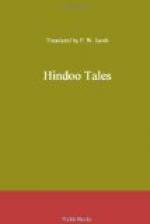He replied: “The King of Suhma, called Tungadhanwa, being without offspring, begged from the feet of Durga, called Vindhyavasini,[11] dwelling in this abode, having her love for the abode in Vindhya forgotten, two children, and by her in a vision to him sleeping near (her temple) direction was given: ’There shall be produced of thee one son, and one daughter shall be born; but he shall be in subjection to her husband. But let her, beginning from the seventh year till her marriage, propitiate me every month while the moon is in Krittika (the constellation of the Pleiades), with the ball-dance, for the obtaining an excellent husband; and whom she likes, to him she is to be given and let this festival be called the Ball Festival.’ So she said.
“Then in a very short time the beloved queen of the king, named Medini, bore a son, and a daughter was born at the same time. That damsel, called Kandukavati, will to-day propitiate the goddess having the moon as a diadem.
“But her friend, Chandrasena by name, her foster-sister, was beloved of me; and in these days she has been violently besieged by the king’s son Bhimadhanwa. Therefore I, distressed, perplexed at heart by the pain of the arrow-darts of Kama, somewhat consoling myself with the soft tones of the lute, occupy a solitary place.”
And at that moment there came near a certain sound of anklets, and a certain lady came up. He indeed having seen her, with eyes opened wide, having risen up, having been embraced by her, sat down; and he said “This is the (lady) dear as my life, separation from whom, burning as it were, burns me up; and by that prince the robber of this, my life, I am brought to a state of coldness, as if by death; and I shall not be able, saying he is the king’s son, to practise loyalty towards him; therefore, having caused myself to be favourably regarded by her, I will abandon a life which has no remedy.”
But she, with her face full of tears, said “O beloved, do not, on my account, engage in violence. Thou, who having been born of a worthy merchant, Arthadasa, wast called Kosadasa by thy parents, art called by thy enemies Vesadasa (slave of a girl), from thy excessive attachment to me. Thou thyself being dead, I should imagine the popular saying would be (he was) Nrisansa-Vesa—the slave of a wicked one. But now take me to any place you will.”
But he said to me: “Friend, in the regions seen by you, which was (the most) prosperous, abounding in corn, and having the greatest number of good men?”
To him, having laughed a little, I said “Wide is this (world bounded by) ocean and sky. There is no end of pleasant regions in one place or another. But, indeed, if I should not be able to produce some plan causing you to live comfortably here, then, indeed, I will show you the way.”
Meanwhile, the sounds of jewel-anklets arose. Now she, in a hurry, said: “My lord’s daughter Kandukavati is come to propitiate Durga with playing at ball; and she is of unforbidden sight in this Kanduka (ball) festival. May the eye of you going to see her be successful; I must be keeping near her.” So saying, she went away, and we two followed her.




